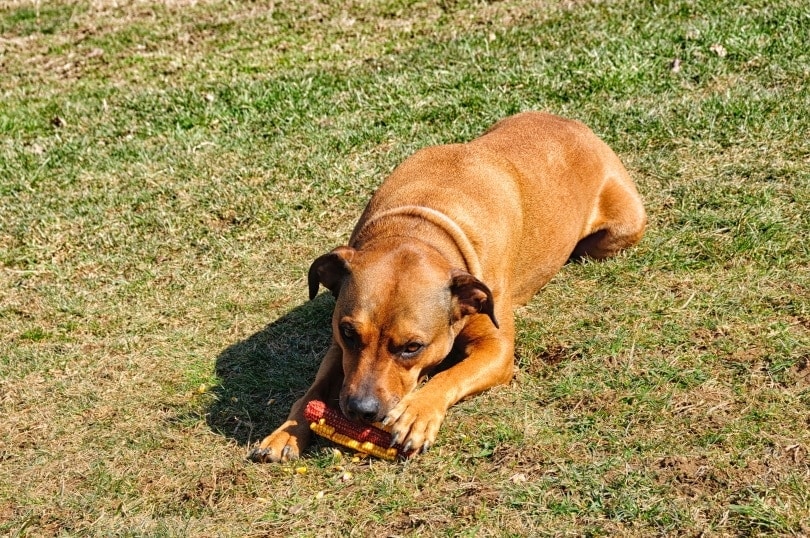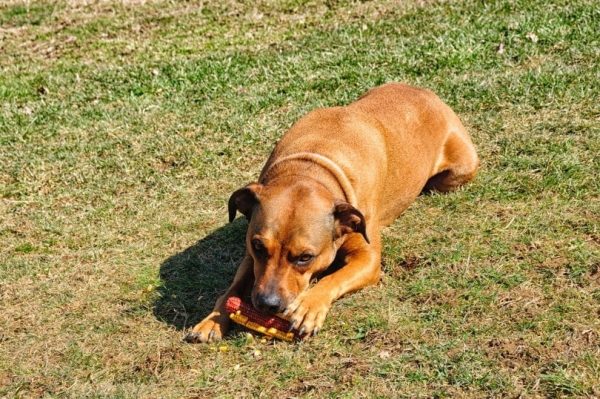Click Below to Skip Ahead
A Boxweiler is a mix of a Rottweiler and a Boxer—so you know you are going to get a large dog! They are strong and sturdy in build and have the personalities to match. The Boxweiler tends to have characteristics of both parents, so they are both playful and protective.
Breed Overview
Height
21 – 27 inches
Weight
70 – 100 pounds
Lifespan
8 – 13 years
Colors
Brown, fawn, white, black, brindle
Suitable for
Active families with older children, experienced dog owners
Temperament
Protective, dedicated, playful, intelligent
They make good dogs for experienced dog owners who can give them the firm training and attention they need to thrive. Active families with older children are ideal for these energetic dogs. If this sounds like you, keep reading to learn more about this breed!
Boxweiler Puppies
If you want to adopt one of these playful and dedicated dogs, it is important to make sure you are choosing a reputable breeder if you decide to work with one to get a Boxweiler puppy.
Although they are not common, it may be possible to find Boxweilers in shelters throughout the United States. You may also be able to find a Boxweiler through a Boxer or Rottweiler breed-specific rescue.
It is also very important to know that Boxweilers are prone to some pretty serious health problems and you may incur higher than normal veterinary costs throughout your dog’s lifetime.

Temperament & Intelligence of the Boxweiler 🧠
Both of their parents are intelligent canines who have been used as working dogs for years, so it is no surprise that the Boxweiler is the same. They are smart and very trainable, provided they have an experienced owner who knows how to bring out the best in them. Boxweilers are playful and affectionate toward their families but can be wary of strangers. This makes them excellent watchdogs and protectors.
Are These Dogs Good for Families? 👪
Boxweilers are good dogs for families with older children. Their large size does not make them a great choice for families with small children. Although Boxweilers are not known to be aggressive toward their families, smaller children can make them nervous. Young children may also not understand how to play gently with such a large dog.
Boxweilers also need families who will not leave them alone for long periods. The Boxweiler becomes very attached to its family and can become destructive when left alone for too long. However, for the right family, the Boxweiler can make a wonderfully playful, and dedicated companion. They love to run around and play as much as they love to cuddle on the couch at the end of the day.
Does This Breed Get Along with Other Pets? 🐶 😽
The Boxweiler is a large dog descended from two breeds who were originally hunting dogs so they may not be the best choice if you have other smaller pets. They also tend to prefer to be the only pet in the family. This being said, they can get along with other dogs and even cats as long as they are introduced to them at a young age. Because of their size, they should always be monitored while around smaller animals.

Things to Know When Owning a Boxweiler
Boxweilers are great pets for the right family. They have a good deal of energy and need plenty of firm training due to their size. Along with these considerations, you should also be aware of their potential health problems, grooming needs, and diet requirements. Read on to learn more about what you can expect if you plan on bringing a Boxweiler into your family.
Food & Diet Requirements 🦴
Even though they are active dogs, the Boxweiler will gain weight if overfed. They require high-quality food for large breeds to meet their energy requirements. You should talk to your veterinarian for recommendations for your dog based on their specific health conditions, life stage, and activity level.
Because of their tendency toward weight gain, you should limit the number of treats you give your Boxweiler. You should also avoid giving them table scraps. The best way to help them maintain a healthy weight is to stick to a regular feeding schedule and make sure they get plenty of exercise.
Exercise 🐕
The Boxweiler has a lot of energy and needs plenty of physical and mental exercise. They do not do well in a small apartment or when left alone for a long time. They love games like fetch and chasing a ball. The Boxweiler also enjoys long walks and time outside with their family. If you have a large, fenced yard and a family that likes being outside, that would be perfect for a Boxweiler.
Mental exercise is also important for this breed. They are intelligent and need mental stimulation. Interactive games and food puzzles are perfect choices to keep their brain active.
Training 🎾
Boxers and Rottweilers are both highly trainable and intelligent and the Boxweiler inherits these traits. There is a slight tendency to be stubborn, but an experienced trainer can overcome this obstacle and bring out the best in your Boxweiler. They like to please their owners and enjoy the challenge that learning new commands provides them with.
The Boxweiler must receive training from puppyhood as they are large dogs who need some discipline and training to ensure they will be great pets.
Grooming ✂️
The Boxweiler has minimal grooming requirements. Their coat is short and requires brushing once or twice per week, perhaps more frequently during shedding seasons.
Rottweilers do drool frequently, so if your Boxweiler takes after their Rottweiler parent, they may do so as well. Occasional baths may be helpful if your dog begins to smell.
Finally, regular nail clipping, tooth brushing, and ear cleaning will prevent issues with your pet’s feet, mouth, and ears.
Health and Conditions 🏥
- Ear Infections – The Boxweiler tends to get frequent ear infections. Regular checking and cleaning of their ears can help prevent these.
- Dental Issues – Regular teeth brushing can help prevent problems with your dog’s teeth and gums.
- Hip Dysplasia – Like many large breed dogs, Boxweilers are prone to this painful and often debilitating condition. If it becomes too painful, surgery may be required.
- Cancer – Cancers like bone cancer and hemangiosarcoma appear more frequently in these breeds than in others. In some cases, life can be extended but these cancers often spread quickly before they are detected.
- Heart Conditions – Most heart conditions can be detected with frequent physical exams. Many are controlled with medications that can extend your pet’s life.
- Degenerative Myelopathy – This condition affects older dogs. It is progressive and attacks the spinal cord leading to the loss of hind limb coordination and eventual paralysis.
The Boxweiler is prone to some of the same health conditions that bother both Boxers and Rottweilers. While mixed breeds can be healthier than purebreds, there are still some more serious conditions that you need to be aware of if you are going to bring a Boxweiler into your family.
 Male vs Female
Male vs Female
There is no obvious difference in temperament between the male and female Boxweiler. Both are great family dogs with the right training and socialization. When it comes to size, females tend to be slightly smaller than males.
3 Little-Known Facts About the Boxweiler
1. They Are Highly Sensitive
The Boxweiler is a very sensitive dog. Thus, they do not respond well to negative training of any kind. Positive reinforcement will get you much better results with these intelligent dogs.
2. Both Boxers And Rottweilers Are Originally From Germany
Both of the Boxweiler’s parents come from Germany. It is believed that the first Boxweiler was born sometime during the 1980s. There is debate over whether this occurred in Germany or elsewhere.
3. They Need Plenty of Mental and Physical Activity
Boxweilers have a lot of energy and need plenty of exercise of both the mental and physical variety. They thrive when challenged to use their brains and bodies.

Final Thoughts
The Boxweiler is not the right dog for everyone. They are sweet, protective, and loyal but they do have specific energy and training needs that must be met. However, if you are active and able to dedicate the needed time and effort to their training, the Boxweiler might be a good fit for your family. They make excellent playmates, companions, and watchdogs.
- See also: Lab Rottweiler Mix
Featured Image Credit: Malachi Jacobs, Shutterstock








